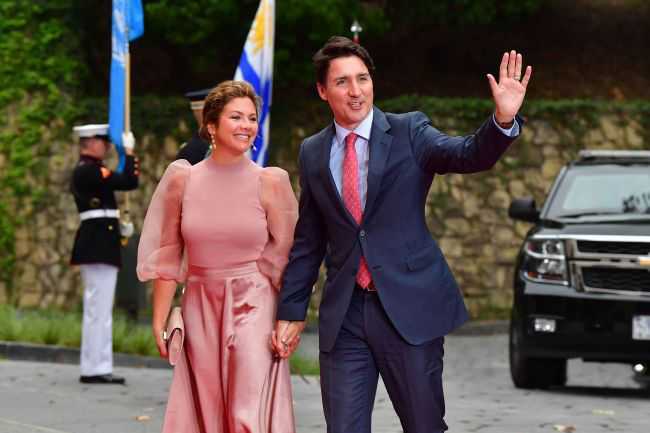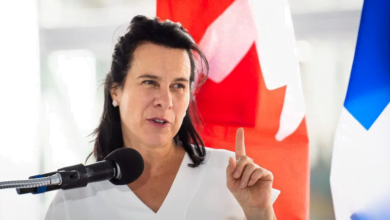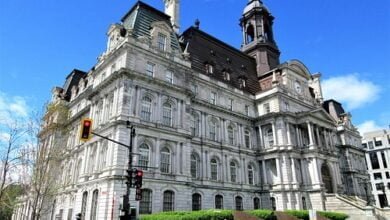
The announcement of Canadian Prime Minister Justin Trudeau’s separation from his wife, Sophie Gregoire Trudeau, has sent shockwaves around the world. The couple’s 18-year marriage and three children together had been a symbol of stability and strength, making the news all the more surprising. As the world watched this high-profile couple navigate through personal turmoil, the timing of the separation added an extra layer of complexity, coinciding with Canada’s upcoming federal election. The impact of this development on Trudeau’s political career and the nation’s political landscape is a topic of great interest and speculation.
On August 2, 2023, Justin Trudeau and Sophie Gregoire Trudeau took to social media to announce their separation. The Prime Minister shared a heartfelt message on his Instagram account, expressing gratitude for the years spent together and emphasizing their continued commitment to their children’s well-being. The public response to the announcement was overwhelming, with both support and surprise from individuals across the globe.
The news of the separation reverberated across the nation, sparking conversations about the intersection of public life and personal struggles. The Canadian public, who had come to know Trudeau as a prominent political figure and family man, was taken aback by the revelation of his marriage’s dissolution. This display of vulnerability from the Prime Minister opened up discussions about the challenges that come with holding public office while also navigating personal hardships.
Trudeau and Sophie Gregoire Trudeau’s union had been a prominent part of the Canadian political scene since they married in May 2005. Throughout Trudeau’s political career, the public observed their relationship, which often resonated as a source of inspiration for many. The announcement of their separation marked the end of a chapter that had impacted both their personal lives and their political personas.
While leaders are typically perceived as being larger than life, the dissolution of Trudeau’s marriage served as a reminder that political figures, like anyone else, experience challenges in their personal lives. The public was reminded of the shared human experience, and the discussion around the Prime Minister’s separation shifted to a broader examination of mental health, coping mechanisms, and the pressures of public life.
The timing of the separation announcement could not have been more significant, as Canada was gearing up for a federal election. Speculation arose about the potential implications on Trudeau’s political career and the Liberal Party’s chances in the upcoming election. Some questioned whether the announcement would impact voter sentiment and how it might affect Trudeau’s ability to lead effectively during a critical period for the nation.
The announcement came at a time when Trudeau’s popularity was already experiencing fluctuations due to various policy decisions and political controversies. As a leader known for his progressive stance on climate change, immigration, and social issues, Trudeau’s personal life became intertwined with his political career. This entanglement raised questions about whether the Prime Minister’s separation would have lasting repercussions on the national political landscape.
Despite the personal challenges he faced, Trudeau displayed a strong resolve to continue his political journey. He publicly stated that he intended to participate actively in the election and affirmed his commitment to Canada’s progress. This declaration garnered mixed reactions, with some applauding his dedication and others expressing concerns about the balance between personal and political responsibilities.
The Prime Minister’s commitment to staying the course amid his personal challenges reignited discussions on the qualities of a strong leader. In a world where leaders are often expected to be stoic and invulnerable, Trudeau’s decision to persevere in the face of adversity demonstrated a different facet of leadership—one that embraces vulnerability and resilience.
The news of Trudeau’s separation reverberated around the world, drawing attention from media outlets of all kinds. Reputable sources such as NPR, CNN, Reuters, The Guardian, and Al Jazeera extensively covered the story, analyzing its potential ramifications on both the political and personal fronts. The extensive media coverage shed light on the global interest in the personal lives of political leaders and the intricate relationship between personal matters and public duties.
The media frenzy also sparked debates about the boundaries between public and private life for politicians. As the separation news dominated headlines, journalists, and public figures grappled with the ethical implications of covering a leader’s personal struggles and how it might impact public perception of their leadership capabilities.
Trudeau’s personal life inevitably became intertwined with the election campaign. Political opponents had to carefully tread the line between addressing the Prime Minister’s separation respectfully and focusing on policy matters. The situation presented a challenge for all parties involved, with the opposition facing the delicate task of addressing this development while maintaining the political discourse centered on national issues.
The intersection of personal and political during an election campaign highlighted the complexity of leadership in the public eye. As voters considered their choices, they were not only evaluating political platforms but also weighing the Prime Minister’s character and resilience during challenging times.
The Canadian public’s reaction to Trudeau’s separation was multifaceted. Many expressed empathy and support, acknowledging that politicians, like everyone else, face personal challenges. However, there were also those who voiced concerns about the potential distractions from the election agenda and whether this development might overshadow crucial policy discussions.
The public’s response to Trudeau’s separation underscored the shifting dynamics in political discourse, where voters are more willing to consider the human side of leaders. It encouraged conversations about the expectations placed on politicians and the importance of considering their personal well-being in the context of their leadership roles.
Trudeau’s separation prompted a broader conversation about the intersection of personal and political life for public figures. It highlighted the challenges leaders face in maintaining a balance between their roles as politicians and private individuals. The burden of public scrutiny and the demands of political life often clash with the need for privacy and personal growth, creating a delicate dance for public figures to navigate.
The discourse surrounding Trudeau’s separation also brought forward discussions on gender dynamics in politics. Female politicians have historically faced intrusive questions about their personal lives and family responsibilities. The public response to Trudeau’s announcement invited reflections on whether male politicians, like their female counterparts, should also be subjected to similar scrutiny about their personal decisions.
Trudeau is not the first political leader to face personal challenges in the spotlight. History is replete with examples of other leaders who encountered similar situations and had to navigate the complex terrain of personal matters amid their public responsibilities. Examining how past leaders managed such circumstances can offer valuable insights into handling these situations effectively.
Looking back at the experiences of leaders who gracefully balanced personal challenges with political responsibilities can serve as a guide for Trudeau and other public figures navigating through difficult times. These examples can offer encouragement and a sense of camaraderie for leaders experiencing similar trials.
The manner in which Trudeau handles his separation will undoubtedly shape the public’s perception of his leadership qualities. Resilience, strength, and the ability to remain focused amid personal trials are qualities often associated with effective leaders. As Trudeau forges ahead with his political ambitions, the world will observe how he manages the emotional turmoil and continues to lead Canada through challenging times.
The concept of leadership resilience, in the face of personal adversity, also highlights the need for leaders to have access to support systems and mental health resources. It serves as a reminder that leaders, like any individual, require support and resources to navigate the complexities of public
The spotlight on Trudeau’s separation also highlights the importance of mental health awareness and support for public figures. Politicians, like anyone else, can experience emotional challenges and may need resources to cope with the pressures of public life. This situation underscores the need for improved mental health initiatives and support structures for leaders.
The separation announcement offered an opportunity to start a public conversation about mental health, its impact on leaders, and the broader implications of mental health support in society. By openly addressing mental health, politicians can help reduce the stigma surrounding this issue and promote healthier approaches to leadership.
Trudeau’s separation has captured global attention and sparked discussions on the complex relationship between personal life and political career. The Prime Minister’s announcement during a crucial election period adds further complexity to an already sensitive matter. As the world watches this high-profile couple navigate through their separation, it prompts reflection on the challenges faced by leaders in balancing their public and private responsibilities.
The impact on the upcoming election remains uncertain, with different opinions prevailing on how this development will influence voter sentiment. As Trudeau demonstrates his resolve to continue his political journey, the nation and the world will closely observe how he maintains focus on leading Canada while dealing with the emotional upheaval in his personal life.
Regardless of the outcome, the situation offers an opportunity for public figures and the broader society to explore the delicate balance between the public and private spheres. The lessons learned from Trudeau’s experience may shape the way future leaders approach the complexities of being a public figure while facing personal challenges.
In the end, the intersection of personal life and political career presents a complex tapestry that demands compassion, understanding, and a keen awareness of the responsibilities that come with leadership in the public eye. As the journey unfolds, the world stands witness to the human aspect of leadership, reminding us all that political figures are not exempt from the challenges and triumphs of personal life.
Through the lens of Trudeau’s separation, the global community has the opportunity to collectively reevaluate the expectations and demands placed on public figures. By fostering a more compassionate and supportive environment for leaders, society can enable them to navigate personal challenges while upholding their responsibilities and promoting a more empathetic and resilient brand of leadership.



